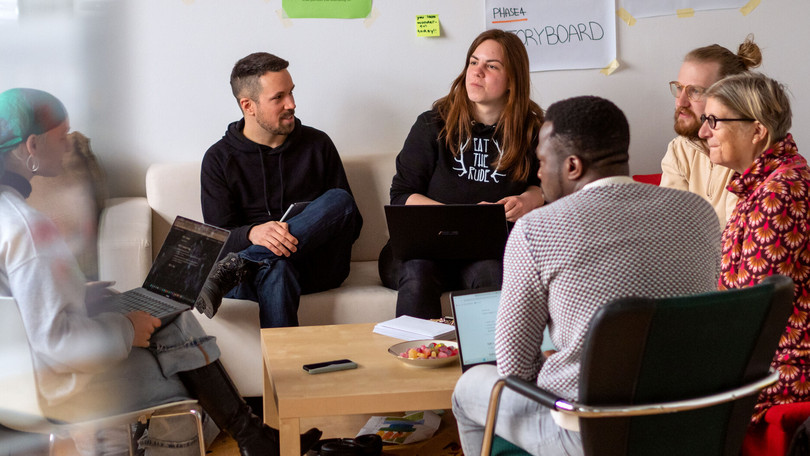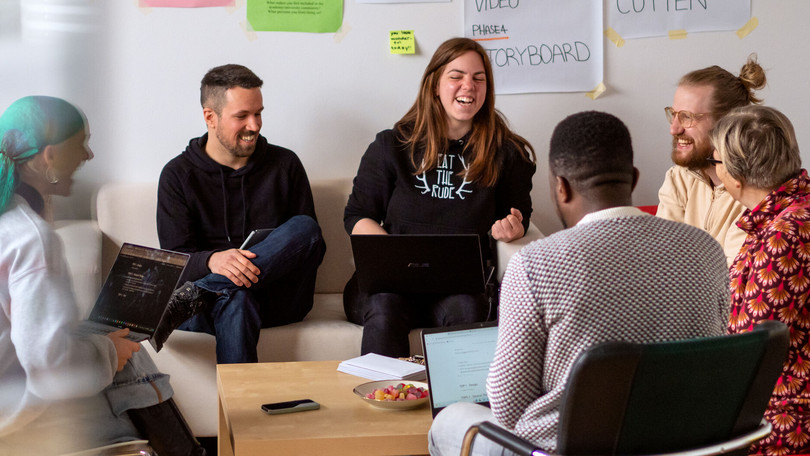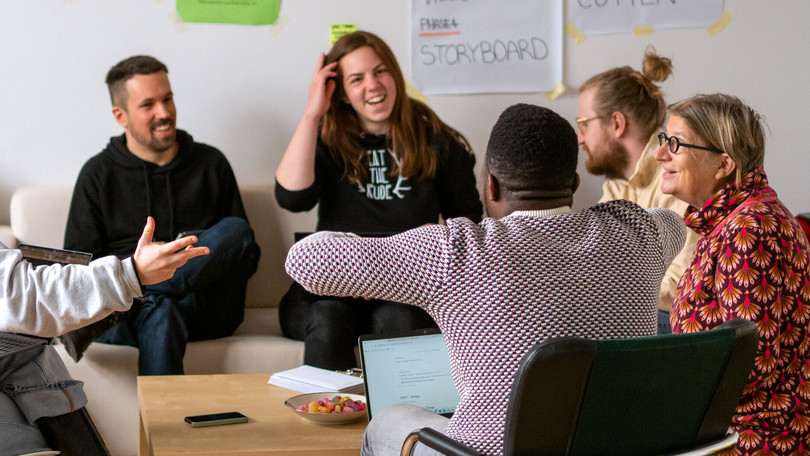Future-oriented learning architecture
2023-04-06 With the Transformation::Rooms, a new learning space is being created at Leuphana together with students and teachers. The teaching development project "Teaching Innovation by Strengthening the Debate Culture" (LSD) also uses the Transformation::Rooms to teach and learn differently.
Sunlight streams through the large windows of the Transformation::Rooms opposite the library. The staff of the teaching development project "Teaching innovation by strengthening the culture of debate" sits together on a light sofa and dark armchairs. "The openness of the rooms and the friendly atmosphere encourage interaction and we can establish the Transformation::Rooms as a contact point for those interested in our project," says the team. Together with project leader Dr. Steffi Hobuß, eleven student employees, some of them international, from different degree programmes want to use the teaching development project to raise awareness of speech situations in courses.
"Speaking situations at the university are not always positive for everyone involved. Some students are afraid of failing and not being good enough. That's why they don't participate in the seminar discussion. Conversely, it can be unpleasant for teachers when students remain silent. By focusing on speaking situations, we also look at power structures and mechanisms that shape the culture of debate at the university and often trigger discomfort," the team explains. Both teachers and students are to be sensitised to enabling and aggravating conditions of speaking in courses. The goal is to promote active participation in discussions by as many students as possible, especially in seminars, and thus contribute to a better culture of debate at the university.
To this end, the participants are developing, among other things, a student initiative that promotes reflective, respectful and constructive exchange, on the one hand, among students and, on the other hand, between students and lecturers about speech situations in courses. The Transformation::Rooms support creative exchange through their architecture, says the team: "There is a lot of design freedom. We can use the place as a working space for our project meetings, set it up as a safe space for sensitive conversations or for our workshops." The teaching development project is funded by the Stiftung Innovation in der Hochschullehre with about 225 000 euros.
But the project meetings on the debate culture are only one example of how the new Transformation::Rooms are being used. "We looked at the question of how a physical space influences learning and our togetherness. What practices are fostered by different spatial designs? We focus on participation," explains Dr. Theres Konrad, who, as a learning architecture agent in the cooperation service, accompanies the development of the Transformation::Rooms.
Centrally located on campus, an ensemble of teaching-learning spaces and student innovation spaces has been created by transforming rooms of the former shop row. There is a deliberate variety of furniture - from beach chair to sofa to stool, from coffee table to worktop to pinboard, in order to facilitate as many learning and teaching situations as possible. The redesign of the Transformation::Rooms is funded by the Stifterverband für die deutsche Wissenschaft and the Dieter Schwarz Stiftung as part of the funding initiative "Raumlabore. Experimental spaces for future-oriented learning architectures" with 100,000 euros. "It was exciting for the Stifterverband that we are developing the spaces in an experiment with the students and teachers, centred around the competences for transformation, innovation and future-based teaching," explains Dr. Annette Schöneck, Entrepreneurship Officer. The rooms have already been tested with students in accompanying courses. Student initiatives also meet there and interested parties can join them.
Now the project is entering its second phase. During the lecture-free period, a programme booklet for the summer semester was created. Those interested can look forward to events on the themes of Transforming *space *self *society and *education. The room layouts will continue to change over the next few months and will be improved through accompanying evaluation. The Cradle to Cradle Initiative, for example, will continue to actively shape the Transformation::Room through its hands-on project.
Nationwide, 136 higher education institutions applied for funding, and five of them were successful with their concepts. The results of the evaluations will be shared with the participating universities.
Operational responsibility for the Transformations::Rooms lies with Leuphana's Cooperation Service, where Dr Theres Konrad, Dr Nicolas Meier, Dr Annette Schöneck and Andrea Japsen are in charge of supervision and coordination.
Prof. Dr. Steffen Farny, Prof. Dr. Torben Schmidt, Prof. Dr. Matthias Wenzel and Prof. Dr. Boukje Cnossen are responsible for the scientific and didactic aspects of the project. Dr. Julia Webersik and Katharina Trostorff support the project from the teaching service side.
Students from numerous initiatives and transformation enthusiasts from all disciplines as well as other practical partners from the region are involved as central partners, co-operators and co-developers.



